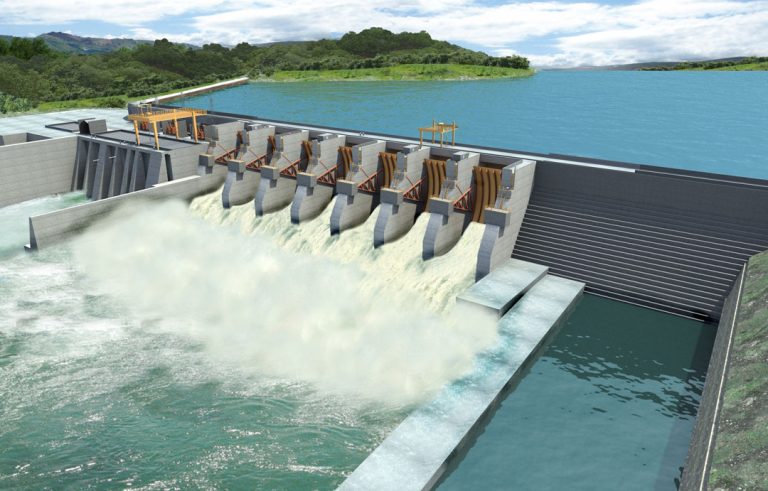8 de abril 2016

The Return of the Military

PUBLICIDAD 1M
PUBLICIDAD 4D
PUBLICIDAD 5D
Following five years of delays, the political crisis in Brazil and the Lava Jato case deal the final blow to the energy megaproject

Una imagen muestra cómo debía haber sido el proyecto Tumarín una vez terminado.
The Queiroz Galvão construction firm is leaving the country, its funding sources affected by the Brazilian political crisis. The firm, together with the Brazilian state company Eletrobras owns 90% of the Nicaraguan Hydroelectric Center (CHN), the company behind the Tumarín hydroelectric project.
Engineer Roberto Abreu de Aguiar, General Manager of CHN, which received a special concession from the National Assembly, will leave Nicaragua at the end of April, following five years at the head of this project that has experienced countless delays.
“In the next few days, the firm will be issuing a communiqué explaining the decision and their agreement with the government,” stated an Ortega administration source linked to the project.
When contacted by Confidencial, Abreu said that “he wasn’t authorized to offer declarations,” but he confirmed that a communiqué would be issued in the next few days.
Ex-Minister of Energy and Mining Emilio Rappaccioli, currently a presidential advisor on Renewable Energy, didn’t deny the departure of Queiroz Galvão but recommended that we speak with Salvador Mansell, present head of the Energy and Mining Ministry. “I’m in an interview, call me later,” Mansell excused himself upon being consulted, then failed to respond to later calls.
The Tumarín dam was to be constructed in the community of Apawás in the South Caribbean zone of Nicaragua. A dirt road 50 kilometers long was built and CHN purchased the land of residents who would be affected by the project, following long and difficult negotiations that on repeated occasions provoked complaints from the residents. Brazilian capital has invested between 20 and 40 million dollars in Tumarín, according to energy experts.
Tumarín is a 1.1 billion dollar project that would have an installed capacity of 253 megawatts, equivalent to 50% of the current energy consumption in Nicaragua. According to projections, its functional entry into the system would modify the energy matrix of the country.
Business executives from the Chamber of Energy affirmed that they were never approached by the Brazilians, and that the contract was handled directly by the national authorities. One of the big discussions between CHN and the Ortega government was the price of the megawatt hour, and also whether the Nicaraguan-Venezuelan entity ALBANISA could participate in the business venture.
Comandante Ortega wanted ALBANISA not only to be a partner in the project but also to form part of the construction team. Nevertheless, that proposal encountered strong objections from Brazil. In February 2014, diplomatic sources assured that following exhaustive discussion of the technical and economic aspects of the Tumarín project, the future of the project would remain in the hands of President Dilma Rousseff.
César Zamora, the in-country manager of the energy company IC Powers, considers that the withdrawal of the Queiroz Galvão firm is due to the situation in Brazil: accusations of corruption that have affected the companies associated with government projects and a political crisis that is suffocating Rousseff’s government.
The Queiroz Galvão company was investigated during the operation known as Lava Jato that unraveled a gigantic web of corruption in the heart of Petrobras, the largest public utility in Latin America. The principal Brazilian construction companies were affected, among them Odebrecht.
The two top executives of Queiroz Galvão were arrested and accused of participating in the authorization of millions of dollars in bribes to politicians and business leaders. Othon Zanoide of Moraes Filho, the general director of Commercial Development of Vital Engineering, and Ildefonso Colares Filho, president and director of Queiroz Galvão were jailed.
This extraordinary situation has caused layoffs, and the foreign projects that these companies were developing with Brazilian funds have been reduced in scope or frozen.
“The government and authorities here have offered them everything they need to be able to implement the project. There’s no greater stimulus than the contract they have…. They’re leaving because they can’t raise the money they need. It’s an internal problem,” Zamora concluded.
Recovering the investment
The president of the Energy Chamber estimates that Queiroz Galvão and Electrobras have invested 40 million dollars in Tumarín, “and they’re going to want to recover that in some way.” The best way, according to the businessman, would be to sell the project. “But who would buy it?” he asked.
When questioned whether the Ortega government would acquire it, Zamora noted: “there are better projects to invest in.”
“It’s not a good project, because it’s very expensive. You have to invest about 1.1 billion dollars to obtain 250 megawatts that it generates 50% of the time. You’re paying almost $8,000 dollars a kilowatt. That’s outrageous,” he explained.
Zamora recalled that when Tumarín was originally conceived it provoked a lot of excitement because the price of oil was at 100 dollars. Right now it’s $24 a barrel for crude. “They are waiting for things in Brazil to improve and for the price of oil to go above $60 so that it can have some kind of economic viability,” insisted Zamora. Until then, he believes that Tumarín will continue “in an induced coma.”
Archivado como:
PUBLICIDAD 3M
Periodista. Destaca en cobertura a violaciones de derechos humanos: desplazamiento forzado, tráfico ilegal en territorios indígenas, medio ambiente, conflictos mineros y ejecuciones extrajudiciales. Premio Iberoamericano Rey de España 2018.
PUBLICIDAD 3D